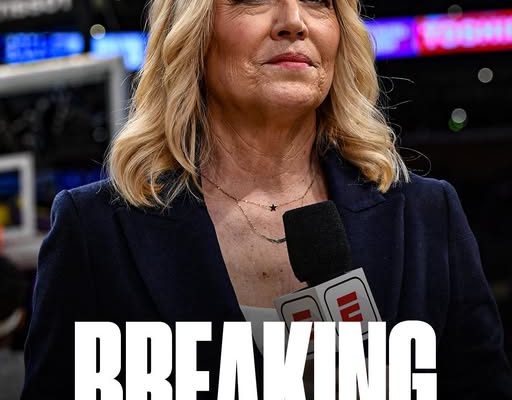In a seismic shift that has reverberated throughout the sports media landscape, ABC/ESPN has made a stunning and controversial alteration to its lead NBA broadcast team, demoting the widely respected and pioneering Doris Burke in favor of promoting analyst Tim Legler, according to a report by The New York Post’s Andrew Marchand.
The move restructures the network’s premier booth for the upcoming NBA Finals and beyond. The new team will feature the iconic play-by-play voice of Mike Breen, with Legler and Richard Jefferson serving as the primary color analysts. Burke, who made history as the first woman to serve as a full-time game analyst for a major men’s professional sports championship in 2020, will be reassigned to the network’s secondary broadcast crew, a decision that has been met with immediate and widespread criticism from fans and media peers alike.
This decision by ESPN management represents a dramatic reversal of its recent trajectory. For years, the network had been lauded for its progressive and merit-based promotion of Burke, whose basketball intellect, nuanced analysis, and effortless chemistry with Breen had earned her near-universal acclaim. Her journey from the sidelines reporter to the analyst chair was seen as a hard-earned and deserved ascension, breaking long-standing barriers in the process. Her presence on the #1 team was not a diversity hire; it was the result of decades of impeccable preparation, deep knowledge, and a broadcasting style that prioritized the game’s intricacies over loud, confrontational debate.
The promotion of Tim Legler, while not entirely unexpected given his rising profile, comes as a surprise in its scope and the personnel move it necessitated. Legler, a former NBA sharpshooter and the 1996 Three-Point Contest champion, has built a formidable reputation as one of the most insightful Xs-and-Os analysts in the business. His work on ESPN’s daily programming, particularly his film breakdown segments, is revered by a dedicated segment of the audience for its clarity and depth. He is a analyst’s analyst, known for his ability to explain complex offensive and defensive schemes in an accessible manner. His chemistry with Jefferson on the popular “Hoops Tonight” podcast and various ESPN shows is well-established, suggesting a potentially dynamic three-person booth with Breen.
However, the question that echoes through the halls of ESPN and across social media is not about Legler’s qualifications, but rather the cost of his promotion. Why was it necessary to remove Doris Burke to elevate Tim Legler? The move suggests a fundamental shift in philosophy from the network’s top brass, perhaps signaling a desire for a different tonal quality for its flagship broadcast.
The previous trio of Breen, Burke, and Jefferson was a study in contrasts that, against all odds, found a remarkable rhythm. Breen provided the steady, authoritative narration and historical context. Burke offered the tactical breakdown, the feel of the game’s flow, and a measured, professorial tone. Jefferson, the most recent retiree, brought unabashed energy, modern player perspective, and a willingness to engage in light-hearted banter. It was a blend of old-school professionalism, tactical genius, and new-school exuberance.
The new configuration of Breen, Legler, and Jefferson risks creating an imbalance. While Legler and Jefferson have excellent chemistry, their analytical styles, both born from the perspective of former players, could overlap. Burke provided a unique and distinct voice that acted as a crucial counterweight. Without her, the booth may lean heavily into a more conventional, albeit highly knowledgeable, two-former-player dynamic. Some within the industry speculate that network executives may believe this alignment is more appealing to a certain segment of the audience they are eager to capture, moving away from what they might perceive as a more subdued approach to a louder, more opinion-driven broadcast.
The backlash to the news has been swift and severe. Prominent media figures, journalists, and a vast number of fans have taken to social media to express their disbelief and disappointment. Many have pointed out the glaring incongruity of the move: at a time when women’s basketball is experiencing an unprecedented surge in popularity and respect, the most prominent woman in men’s basketball broadcasting is being sidelined. The message it sends is being widely interpreted as regressive, a pullback from the network’s commitment to diversity and a dismissal of Burke’s clear and present excellence.
Critics argue that Burke’s demotion feels like a punishment for a style of broadcasting that is intelligent, focused, and less confrontational. In an era where sports debate is often loud, hyperbolic, and designed for viral clips, Doris Burke was the antithesis: a steady, reliable source of truth about the game happening on the court. Her analysis was never about herself; it was always in service to the viewer’s understanding of the sport. To many, this decision feels like a rejection of that ethos in favor of a potentially more boisterous, debate-friendly presentation.
For ESPN, the calculus is undoubtedly complex. Television ratings and audience engagement are the ultimate metrics, and the network is in a fierce battle for relevance in a fragmented media world. The executives who made this call clearly see a potent combination in Legler and Jefferson, two personalities who have proven their ability to drive digital engagement and connect with a younger demographic. Legler’s stock within the company has been soaring, and this promotion is the ultimate validation of his work.
Yet, the gamble is enormous. The network risks alienating a significant portion of its core NBA audience that views Doris Burke not as a symbol of diversity, but as simply the best in the business at her job. The optics of replacing a beloved, historic figure with another man, no matter how qualified, are undeniably poor. It opens the network to accusations of succumbing to the very “old boys’ club” mentality it seemed to be moving beyond.
The pressure now falls squarely on the new booth of Breen, Legler, and Jefferson. Their performance during the NBA Finals will be scrutinized under an intense microscope, with every awkward pause, every overlapping point, and every tonal misstep being measured against the ghost of the previous team’s chemistry. Legler, in particular, will be under immense pressure to justify a decision that has already sparked such controversy. He is a brilliant analyst, but he now steps into a role where his every word will be weighed against the narrative that his promotion came at the expense of a trailblazer.
Ultimately, this move by ABC/ESPN is more than a simple personnel change. It is a statement. It is a reflection of the constant tension in sports media between substance and style, between quiet expertise and loud entertainment, between progress and tradition. Whether this statement will resonate with audiences as a bold new direction or backfire as a tone-deaf miscalculation will be one of the defining stories of the upcoming NBA playoffs. The microphone has been passed, but the audience is already voicing its strong, and largely negative, opinion on the matter. The new team’s greatest challenge will not be analyzing the game—they are all eminently capable of that—but winning back the trust and approval of a fanbase that feels it just lost one of its most trusted voices.



